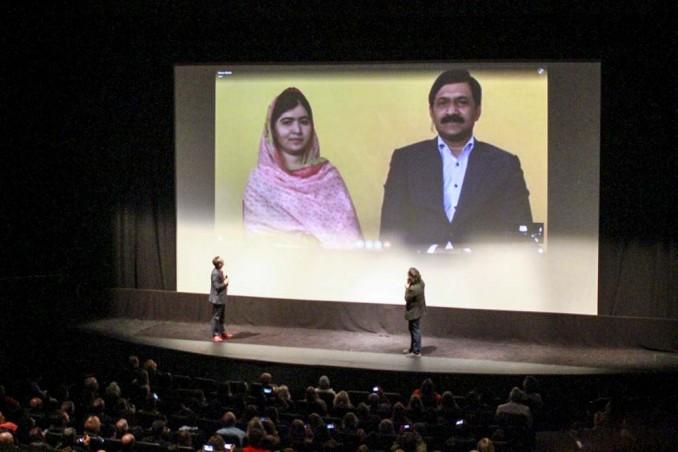By Natalia Balcerzak
He Named Me Malala, directed by Davis Guggenheim, screened at this year’s Toronto International Film Festival (TIFF) in the Ryerson Theatre. The documentary — filmed over the span of two years — is a portrait of Malala Yousafzai, a Pakistani teenager who was shot after standing up against the Taliban. Despite death threats and her own personal struggles, she continues to advocate for women’s education worldwide.
The film doesn’t come off as your typical documentary. Its theatrical storytelling approach is presented from the very beginning when it opens with an animated sequence. Artistically visualizing the 1880 Battle of Maiwand, the sequence features legendary heroine Malalai who led Afghan troops against the British. Yousafzai was named after her.
When the director compared the two women, he said this was the language he wanted to use to tell her story. These impressionistic, hand-drawn, almost lyrical animations became key frames that narrated important events from the past.
“Malala was named after a girl that spoke out and was killed, and then she spoke out and was almost killed,” said Guggenheim. “That’s amazing, you couldn’t have written that.”
The director approached the family on a whim after they relocated to England following the 2012 attack on Malala in their native Swat Valley, Pakistan.
For 18 months, Guggenheim became a part of Malala’s life as she became an internationally recognized figure. From filming at her Birmingham family home to her winning the Nobel Peace Prize, the director shows sides to her that many never knew before. He manages to capture her witty, fierce spirit but also reveals a normal teenager that worries about homework and teases her younger brothers.
Guggenheim said that this documentary turned into one of his best experiences, especially as he saw how relatable they were to everyone else.
“It’s dangerous to look at these people as superheroes, like Mother Theresa or Martin Luther King Jr., that they’re too brilliant and like someone sprinkled them with magic dust,” said Guggenheim. “Malala was an ordinary girl; she became extraordinary by making that choice. To me, that’s a very powerful message.”
Using Malala’s voice as the thread into a pressing issue, the documentary emphasizes how important it is for us to acknowledge what’s happening beyond our Western borders. She told the camera that her story is important not because it’s unique, but because it’s similar to so many others. She represents approximately 66 million girls banned from receiving an education, many of who are threatened with persecution if they are even seen with a book.
He Named Me Malala is not meant to be just a movie: it’s intended to be a tool that will encourage youth to speak out against injustice. After the film’s screening, Malala made a Skype appearance with her father and answered audience’s questions about her future plans.
“My mission is to ensure the rights to an education and hopefully through this movie, we can make a movement,” said Malala. “We, young girls – young people like you, can come together and start joining this campaign.”
Watching the film, it’s difficult not to feel a range of emotions. You laugh along with her, you fear for her, and you’re filled with a heavy sadness for the many battles that are still left to fight.
You come out of that theatre changed, as both Malala and Guggenheim introduce you to a world that pleads for action.










Leave a Reply